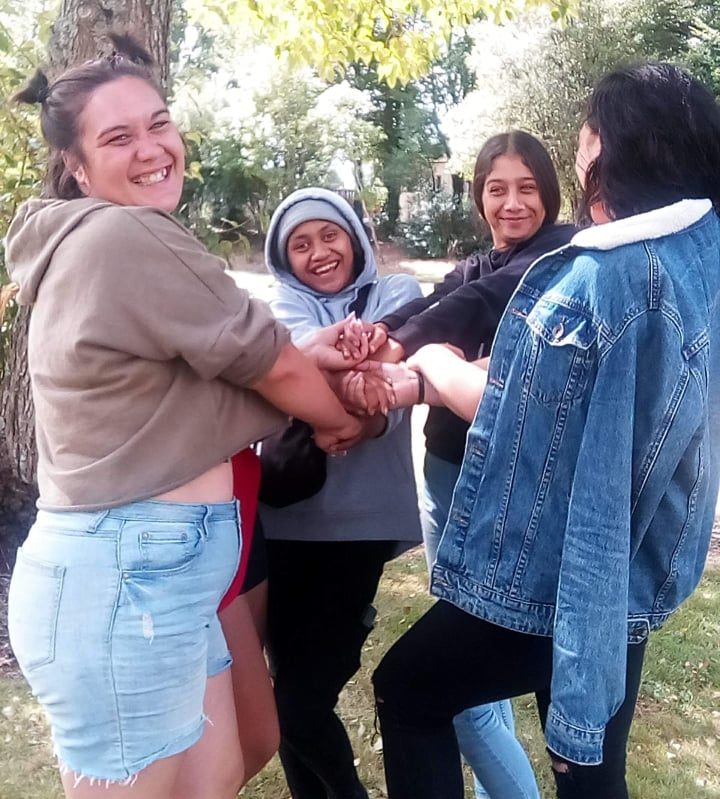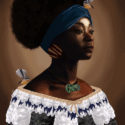Truancy is robbing many young New Zealanders of their right to a quality education.
One extraordinarily determined Tūrangi grandmother has come up with a solution to help the rangatahi in her care achieve more than even they ever thought possible.
Every weekday afternoon, up to 10 of Muriel Mclaughlin’s rangatahi come together to wānanga in a small, time-worn building in a quiet part of Tūrangi. There they work through their respective Te Kura correspondence lessons on a couple of old laptops. The majority have had little or no mainstream schooling for the last four years.
Muriel and Literacy Aotearoa tutor, Wiki Samuels, are there to help them. Their grand nana is there too with biscuits and fresh baking. Aunties and uncles, or older whanaunga, pop in to do whatever they can to support these rangatahi in getting the education that is their birth right.
As the second school year comes to a close for the wānanga, Muriel can already tell impressive success stories. Gone are the days of truancy. Two rangatahi have achieved NCEA Levels 1 and 2. One young person is already planning to set up her own business. An older tāne has left to manage his own garden maintenance contracts. Seven others have gained their driving licences – no small feat for rangatahi whose literacy levels had been handicapped by historic truancy.
Wānanga for friends and whanaunga
The rangatahi who attend the wānanga range in age 8 to 17 years. They’re all close friends and whanaunga of the Ellison-Mclaughlin whānau who, like a significant proportion of children under 16 in Aotearoa experience high-levels of truancy and don’t attend school regularly.

They’re good kids, says Muriel, but they’re not comfortable at school. If they don’t get help when they don’t understand something, they get left behind. Then they get bored.
“When the tamariki act out, they’re sent home without any effort being made to try some other way of fixing their behaviour.
So, they learn that if they’re bored or frustrated or whatever, they just have to be naughty and they can leave. What’s that teaching them?”
Muriel Mclaughlin
Muriel and her sisters, Monica Duff and Michelle Clarke, are kahukura, spearheading change in their wider whānau. Their efforts gained greater urgency in recent years following a series of tragic deaths among their whanaunga that have had a profound effect on everyone, including the children.
Wiki Samuels says that like too many other young people he’s worked with in his capacity as a youth worker, these rangatahi with high levels of truancy have had to focus on surviving before even starting to learn.
“They come from a loving whānau but they have also had to cope with a lot of trauma. But everyone here understands that trauma, so that’s one big hurdle to their engagement in education gone.”
Wiki Samuels
Muriel and Wiki designed these wānanga to suit the specific needs of this group of students.
“This is a whānau. They’re working and learning together as tuakana and teina in the same small room. If someone plays up, one of the older kids or an aunt will sit down with them and find out what’s going on,” says Wiki. “You can’t do that in a school environment with one teacher to 25 or 30 kids.
Equipping rangatahi for the future
For seventeen-year-old Monica Jnr, this whānau wananga has been a revelation and an inspiration.
“I hated school. I didn’t like doing any of the work. I didn’t know how to do it. But in just a few months Wiki has taught me how to do maths and how to spell,” says Monica Jnr.
She knows now that she has a sharp brain and can pick things up quickly. With the right kind of help, she knows she can do more.
“I want to start a business now. I want to have my own beautician’s business. I’ve never thought I could do anything like that before, but I do now.”
Monica Jnr
Another of her younger whanaunga happily demonstrates how quickly he can accurately master the multiple-choice questions for an assignment. He’s enjoying himself – and his achievements.
Muriel watches with a beaming smile, eyes soft with aroha and pride.
She knows these are small but hugely important steps for this rangatahi in building his skills and confidence. They also develop an innate trust that he, just like his peers in mainstream education, will eventually go out into the world with the tools he needs to make a success of his life.
Want more?
Read about E Tū Whānau kaupapa, vision, and Mahere Rautaki (Framework for Change) 2019 – 2023
Join the E Tū Whānau communities on Facebook, Instagram and YouTube.



